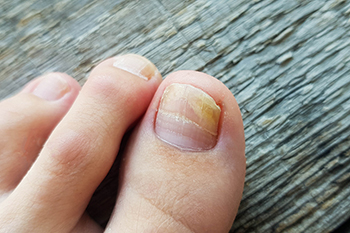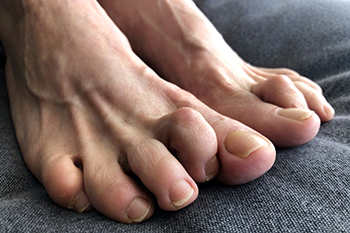Connect With Us
Blog
Items filtered by date: November 2021
Hygienic Ways to Limit Toenail Fungus
 Toenails that have turned brown or yellow in color and/or have become thick and crumbly, may have a fungal infection. These infections are often caused when fungi get into small cracks in the toenails. The fungi that often cause these infections tend to live in warm and moist environments like locker rooms, showers, and pool areas. One thing that can be done to prevent these infections is to make sure to always wear some form of footwear in these environments. Other things that can be done to prevent fungal nail infections include frequently washing the feet, wearing a new fresh pair of socks every day, avoiding sharing footwear with others, as well as wearing breathable footwear. Infected toenails can become painful and emit a foul odor if not treated. Patients who believe that they may already have a fungal nail infection should consult with a podiatrist in order to receive treatment and to prevent the infection from spreading.
Toenails that have turned brown or yellow in color and/or have become thick and crumbly, may have a fungal infection. These infections are often caused when fungi get into small cracks in the toenails. The fungi that often cause these infections tend to live in warm and moist environments like locker rooms, showers, and pool areas. One thing that can be done to prevent these infections is to make sure to always wear some form of footwear in these environments. Other things that can be done to prevent fungal nail infections include frequently washing the feet, wearing a new fresh pair of socks every day, avoiding sharing footwear with others, as well as wearing breathable footwear. Infected toenails can become painful and emit a foul odor if not treated. Patients who believe that they may already have a fungal nail infection should consult with a podiatrist in order to receive treatment and to prevent the infection from spreading.
For more information about treatment, contact one of our podiatrists of Fox Valley Foot and Ankle Specialists. Our doctors can provide the care you need to keep you pain-free and on your feet.
Toenail Fungus Treatment
Toenail fungus is a condition that affects many people and can be especially hard to get rid of. Fortunately, there are several methods to go about treating and avoiding it.
Antifungals & Deterrence
Oral antifungal medicine has been shown to be effective in many cases. It is important to consult with a podiatrist to determine the proper regiment for you, or potentially explore other options.
Applying foot powder on the feet and shoes helps keep the feet free of moisture and sweat.
Sandals or open toed shoes – Wearing these will allow air movement and help keep feet dry. They also expose your feet to light, which fungus cannot tolerate. Socks with moisture wicking material also help as well.
If you have any questions please feel free to contact our office located in Naperville, IL . We offer the newest diagnostic tools and technology to treat your foot and ankle needs.
Turf Toe 101
 Turf toe is a common injury among football and soccer players who play on artificial turf. Other athletes like dancers, gymnasts, and basketball players can also be at risk. Repeated pushing off of the big toe while on hard surfaces can cause stress to the joints and ligaments and lead them to eventually overstretch or tear. When the big toe is bent too far upward towards the foot, turf toe may occur. Common signs of turf toe include increasing pain when putting weight on the big toe, a “popping” sensation when the injury occurs, swelling or stiffness around the big toe, and an inability to move the big toe. Most cases of turf toe are mild, but if the injury causes walking or physical activities (like running or sports) to become painful, it should be checked out by a podiatrist. Upon examination, a podiatrist will be able to diagnose the injury and determine a treatment plan that is best for you.
Turf toe is a common injury among football and soccer players who play on artificial turf. Other athletes like dancers, gymnasts, and basketball players can also be at risk. Repeated pushing off of the big toe while on hard surfaces can cause stress to the joints and ligaments and lead them to eventually overstretch or tear. When the big toe is bent too far upward towards the foot, turf toe may occur. Common signs of turf toe include increasing pain when putting weight on the big toe, a “popping” sensation when the injury occurs, swelling or stiffness around the big toe, and an inability to move the big toe. Most cases of turf toe are mild, but if the injury causes walking or physical activities (like running or sports) to become painful, it should be checked out by a podiatrist. Upon examination, a podiatrist will be able to diagnose the injury and determine a treatment plan that is best for you.
Sports related foot and ankle injuries require proper treatment before players can go back to their regular routines. For more information, contact one of our podiatrists of Fox Valley Foot and Ankle Specialists. Our doctors can provide the care you need to keep you pain-free and on your feet.
Sports Related Foot and Ankle Injuries
Foot and ankle injuries are a common occurrence when it comes to athletes of any sport. While many athletes dismiss the initial aches and pains, the truth is that ignoring potential foot and ankle injuries can lead to serious problems. As athletes continue to place pressure and strain the area further, a mild injury can turn into something as serious as a rupture and may lead to a permanent disability. There are many factors that contribute to sports related foot and ankle injuries, which include failure to warm up properly, not providing support or wearing bad footwear. Common injuries and conditions athletes face, including:
- Plantar Fasciitis
- Plantar Fasciosis
- Achilles Tendinitis
- Achilles Tendon Rupture
- Ankle Sprains
Sports related injuries are commonly treated using the RICE method. This includes rest, applying ice to the injured area, compression and elevating the ankle. More serious sprains and injuries may require surgery, which could include arthroscopic and reconstructive surgery. Rehabilitation and therapy may also be required in order to get any recovering athlete to become fully functional again. Any unusual aches and pains an athlete sustains must be evaluated by a licensed, reputable medical professional.
If you have any questions please feel free to contact our office located in Naperville, IL . We offer the newest diagnostic and treatment technologies for all your foot and ankle needs.
Ways to Avoid Falling at Home
 Falling is one of the leading causes of injury among those older than 65. In fact, one out of every 4 seniors will fall each year. Thankfully, there are plenty of simple things that can be done in order to prevent falls in the home. One step that can be done is to keep the floors at home clutter-free in order to avoid tripping. Installing grab bars in the bathrooms and handrails around staircases can help provide stability and prevent falls. One of the most important things that can be done to avoid falling is to consult with a podiatrist about any falls that you may have experienced, or for more professional advice on fall prevention. A podiatrist will be able to help check your feet and give advice on proper footwear that should be worn as well as review any medications that may make you dizzy or lead to instability.
Falling is one of the leading causes of injury among those older than 65. In fact, one out of every 4 seniors will fall each year. Thankfully, there are plenty of simple things that can be done in order to prevent falls in the home. One step that can be done is to keep the floors at home clutter-free in order to avoid tripping. Installing grab bars in the bathrooms and handrails around staircases can help provide stability and prevent falls. One of the most important things that can be done to avoid falling is to consult with a podiatrist about any falls that you may have experienced, or for more professional advice on fall prevention. A podiatrist will be able to help check your feet and give advice on proper footwear that should be worn as well as review any medications that may make you dizzy or lead to instability.
Preventing falls among the elderly is very important. If you are older and have fallen or fear that you are prone to falling, consult with one of our podiatrists from Fox Valley Foot and Ankle Specialists. Our doctors will assess your condition and provide you with quality advice and care.
Every 11 seconds, an elderly American is being treated in an emergency room for a fall related injury. Falls are the leading cause of head and hip injuries for those 65 and older. Due to decreases in strength, balance, senses, and lack of awareness, elderly persons are very susceptible to falling. Thankfully, there are a number of things older persons can do to prevent falls.
How to Prevent Falls
Some effective methods that older persons can do to prevent falls include:
- Enrolling in strength and balance exercise program to increase balance and strength
- Periodically having your sight and hearing checked
- Discuss any medications you have with a doctor to see if it increases the risk of falling
- Clearing the house of falling hazards and installing devices like grab bars and railings
- Utilizing a walker or cane
- Wearing shoes that provide good support and cushioning
- Talking to family members about falling and increasing awareness
Falling can be a traumatic and embarrassing experience for elderly persons; this can make them less willing to leave the house, and less willing to talk to someone about their fears of falling. Doing such things, however, will increase the likelihood of tripping or losing one’s balance. Knowing the causes of falling and how to prevent them is the best way to mitigate the risk of serious injury.
If you have any questions, please feel free to contact our office located in Naperville, IL . We offer the newest diagnostic and treatment technologies for all your foot care needs.
Do I Need Toe Surgery?
 There are a variety of deformities, joint pain or pain in the ball of the foot that can impact the toes and lead to surgery. Toes can move out of position and deform from factors, such as arthritis or tendons that are tight or out of balance. There are a variety of conservative treatments to help patients with toe-related problems. These include orthotics, strapping and padding the toes, and wearing comfortable shoes with a wide toe box. However, in extreme situations, surgery may be necessary to straighten out the toes. Your podiatrist will have a variety of options, such as releasing or lengthening tendons, putting the joints back in place, or realigning the toes. If you have problems with your toes, and they need to be straightened, please consult a podiatrist to find the best course of treatment.
There are a variety of deformities, joint pain or pain in the ball of the foot that can impact the toes and lead to surgery. Toes can move out of position and deform from factors, such as arthritis or tendons that are tight or out of balance. There are a variety of conservative treatments to help patients with toe-related problems. These include orthotics, strapping and padding the toes, and wearing comfortable shoes with a wide toe box. However, in extreme situations, surgery may be necessary to straighten out the toes. Your podiatrist will have a variety of options, such as releasing or lengthening tendons, putting the joints back in place, or realigning the toes. If you have problems with your toes, and they need to be straightened, please consult a podiatrist to find the best course of treatment.
Foot surgery is sometimes necessary to treat a foot ailment. To learn more, contact one of our podiatrists of Fox Valley Foot and Ankle Specialists. Our doctors will assist you with all of your foot and ankle needs.
When Is Surgery Necessary?
Foot and ankle surgery is generally reserved for cases in which less invasive, conservative procedures have failed to alleviate the problem. Some of the cases in which surgery may be necessary include:
- Removing foot deformities like bunions and bone spurs
- Severe arthritis that has caused bone issues
- Cosmetic reconstruction
What Types of Surgery Are There?
The type of surgery you receive will depend on the nature of the problem you have. Some of the possible surgeries include:
- Bunionectomy for painful bunions
- Surgical fusion for realignment of bones
- Neuropathy decompression surgery to treat nerve damage
Benefits of Surgery
Although surgery is usually a last resort, it can provide more complete pain relief compared to non-surgical methods and may allow you to finally resume full activity.
Surgical techniques have also become increasingly sophisticated. Techniques like endoscopic surgery allow for smaller incisions and faster recovery times.
If you have any questions please feel free to contact our office located in Naperville, IL . We offer the newest diagnostic and treatment technologies for all your foot and ankle needs.
Let the Expert Treat Your Ingrown Toenails
Can the Foods You Eat Affect Plantar Fasciitis?
Plantar Fasciitis is an inflammation of the band of tissue that connects your heel with your toes on the sole of your foot. Many people believe inflammation throughout the body can be reduced by making certain dietary adjustments—particularly by increasing the consumption of anti-inflammatory foods and decreasing consumption of inflammatory foods. Anti-inflammatory foods include green leafy vegetables, carrots, broccoli, strawberries, blueberries, tomatoes, legumes, nuts, lean meats, as well as tuna and salmon which are rich in omega-3 fatty acids. Inflammatory foods have high levels of sugar, including soft drinks, pastries and sweets, candy, processed foods, junk food, refined grains, as well as oils containing omega-6 fats (corn/soy/cottonseed oil), saturated fats and red meats. For more information on how to heal the pain and inflammation of plantar fasciitis, schedule an appointment with a podiatrist.
Plantar fasciitis can be very painful and inconvenient. If you are experiencing heel pain or symptoms of plantar fasciitis, contact one of our podiatrists from Fox Valley Foot and Ankle Specialists. Our doctors can provide the care you need to keep you pain-free and on your feet.
What Is Plantar Fasciitis?
Plantar fasciitis is the inflammation of the thick band of tissue that runs along the bottom of your foot, known as the plantar fascia, and causes mild to severe heel pain.
What Causes Plantar Fasciitis?
- Excessive running
- Non-supportive shoes
- Overpronation
- Repeated stretching and tearing of the plantar fascia
How Can It Be Treated?
- Conservative measures – anti-inflammatories, ice packs, stretching exercises, physical therapy, orthotic devices
- Shockwave therapy – sound waves are sent to the affected area to facilitate healing and are usually used for chronic cases of plantar fasciitis
- Surgery – usually only used as a last resort when all else fails. The plantar fascia can be surgically detached from the heel
While very treatable, plantar fasciitis is definitely not something that should be ignored. Especially in severe cases, speaking to your doctor right away is highly recommended to avoid complications and severe heel pain. Your podiatrist can work with you to provide the appropriate treatment options tailored to your condition.
If you have any questions please feel free to contact our office located in Naperville, IL . We offer the newest diagnostic and treatment technologies for all your foot and ankle needs.

